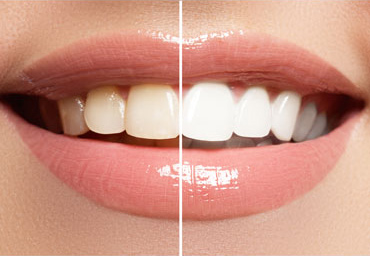Is teeth whitening safe (and how does it impact your teeth)?
What is teeth whitening?
Interested in a brighter smile? Since a smile is one of the first things people notice when they see you, it’s important to keep your smile healthy and sparkling so that you can dazzle the world! From aging to drinking tea, coffee, or red wine regularly, often our teeth tend to become stained or appear more yellow. Fortunately, there are safe and effective teeth whitening options available. The options range from whitening kits, to over-the-counter whitening products, to whitening products dispensed by your dentist to use at home, even to in-office treatments by your dentist.
How does teeth whitening work?

If you are interested in teeth whitening, first you should inform your dental professional. They can help determine if you are a good candidate for teeth whitening and address any existing dental needs like tooth decay or gum disease prior to whitening. They can also answer any questions and determine which is the best whitening option for you.
The most common bleaching agents found in whitening products include hydrogen peroxide and carbamide peroxide. In-office whitening treatments performed by your dental professional often contain higher concentrations of these bleaching agents than can be found in store-bought whitening products.
For in-office teeth whitening, your dentist may apply a whitening gel to the surfaces of your teeth, and may use a LED light. Your dentist may also offer whitening products to use at home and provide you with a custom-fit tray that is shaped to your exact mouth. They will provide you with proper instructions for use and how long to wear the trays.
There are also various over-the-counter whitening products available to help remove surface stains on teeth. Often these products do not contain bleaching agents, but instead have ingredients to remove only superficial stains and debris on the teeth. It is recommended to look for the American Dental Association’s Seal of Acceptance on over-the-counter products to ensure the products are safe and effective. Also, be sure to follow the manufacturer’s instructions when using any product.
What is the difference between teeth whitening and bleaching?
Teeth whitening and bleaching are technically different processes. Teeth whitening products often only contain ingredients that help to remove superficial stains from the teeth making them appear back to their natural color. This is often the case with many toothpastes and mouth rinses. Whereas, bleaching products contain ingredients like hydrogen peroxide or carbamide peroxide that serve to “bleach” the teeth beyond their natural color.
How long does the teeth whitening process take?
In-office teeth whitening can be a quick process, often ranging from one to a few visits. Some in-office whitening treatments may only take about an hour. Whitening trays used at home may be required to be worn for approximately 30 minutes for a few weeks, depending on the instructions given by your dental professional or the manufacturer.
What are the side effects of teeth whitening?
There are some potential side effects of teeth whitening, including gum irritation and tooth sensitivity. These side effects are often temporary and tend to resolve on their own. In addition, protective gels and/or trays are often placed on the gums to prevent the bleaching agents from damaging your gums. If you are experiencing any side effects after teeth whitening be sure to immediately inform your dental professional. Whitening products also will not work in all cases, such as on teeth impacted by trauma, or on teeth with dental restorations such as crowns or fillings.
What are teeth whitening kits and are they effective?
Teeth whitening kits to be used at home have become increasingly popular. They often come with trays, whitening gels with carbamide peroxide and hydrogen peroxide ingredients, written detailed instructions, and sometimes with LED lights. Yet, some whitening kits do not contain gels with the active bleaching agents and will therefore only be able to remove surface stains from the teeth.
Whitening kits have been reported to produce desirable results. However, these kits are typically not as effective as in-office whitening treatments.
Teeth whitening aftercare
It is important to continue practicing good oral hygiene after teeth whitening. You must also note that your teeth will still be susceptible to stains from certain foods and beverages even after teeth whitening. Brushing and rinsing soon after eating and drinking staining items can help to lower the chance of these items sticking to your teeth for long periods of time and causing greater discoloration.
Our doctors and dental specialists provide a wide range of dental services at our 40+ multi-specialty dental offices across Massachusetts and New Hampshire. Our dental team is compassionate, and our main goal is to provide you a comfortable, caring dental experience. Book an appointment at your local Gentle Dental today.



